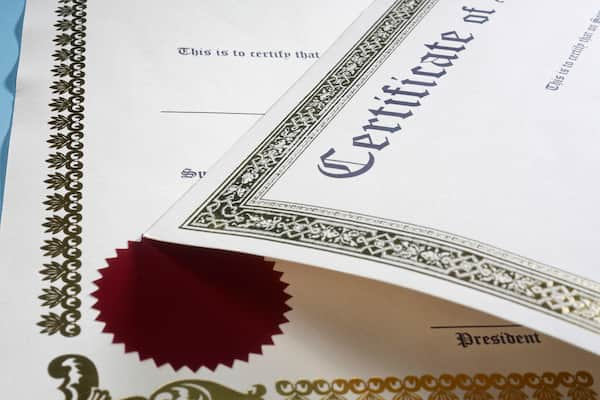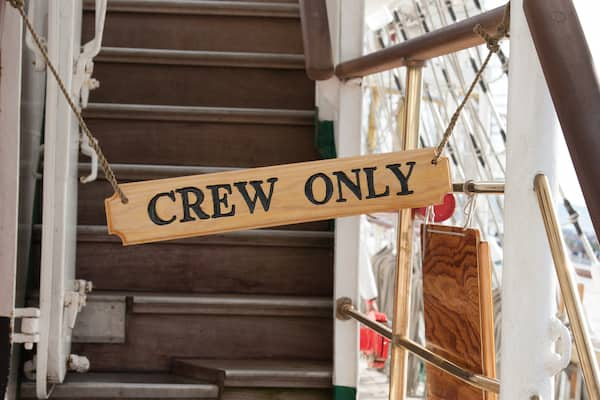How To Become A Yacht Stewardess: A Complete Guide
If you have ever wanted to trade in your 9-5 for a life of working on a luxury yacht, traveling the world, and meeting interesting people?
Well, then a career as a yacht stewardess might just be for you! Sounds like a dream, right?
In this guide, we’ll dive deep into the world of yacht stewardess jobs and explore the ins and outs of the yachting industry.
From the daily duties and required training to interview tips and a step-by-step guide to becoming a successful yacht stewardess, I’ve got you covered.
Let’s get that dream job rolling!

What is a yacht stewardess?
First off, you might be asking yourself “what is a yacht stewardess anyways?” Of course, this is important information to know if you’re looking at becoming one!
The yacht stewardess is an integral part of the interior crew on private yachts and charter yachts.
They are responsible for providing top-notch customer service to yacht owners, their guests, and charter guests.
A stewardess is an entry-level position that often serves as a stepping stone to more senior roles, such as chief stewardess, in the yachting world.

How much do stewardesses make on a yacht?
The pay of a yacht stewardess can vary greatly based on a lot of things such as the size of the yacht, where it is located, and how many years of experience they have.
Generally, if you’re just starting out, you can expect to make around $2,500 to $4,000 per month.
More experienced stewardesses and chief stewardesses usually make more money.
Plus, yacht crew members often get tips from yacht owners and charter guests, which can really add to their income.
Here are some key factors that can affect how much a yacht stewardess makes:
- Position: Chief Stewardess, the person in charge of the inside of the yacht, usually makes more money than the other entry-level stewardesses.
- Experience: It probably goes without saying, but the more experience you have as a stewardess, the more money you’re likely to make since you’ll have better skills and know more about the job.
- Location: Pay can also vary depending on where the yacht is. For example, some areas (like the Mediterranean) might pay more because there’s more demand and/or fancier yachts.
- Charter Yachts vs. Private Yachts: Working on charter yachts can be a good way to earn tips from guests, which can really help increase your income. On private yachts, you might not get tips, but the pay could be more steady and reliable.

What does a Yacht Stewardess do every day?
The duties of a stewardess can vary, but they generally revolve around maintaining the interior of the yacht, tending to the needs of the yacht owners and guests, and ensuring a pleasant onboard experience.
Some of the responsibilities can include:
- Guest service and hospitality: Greeting guests, assisting with their luggage, and providing personalized services throughout their stay on the yacht.
- Housekeeping and maintenance: General housekeeping tasks such as cleaning guest cabins, bathrooms, and common areas, as well as laundry and ironing.
- Food and beverage: Serving meals and drinks, setting tables, and helping the chef with menu planning and food preparation.
- Event planning: Organizing and coordinating onboard (or off-board) events and parties for the yacht owners and their guests.
- Safety and emergency responsibilities: Participating in safety drills and being prepared to handle emergency situations, including fire fighting and personal survival techniques (which is part of the required education we’ll get to below).

Benefits of Being a Yacht Stewardess
Being a yacht stewardess has a lot of amazing benefits that make it a great and exciting career choice – especially while you’re younger.
One of the best parts is the chance to travel to beautiful places and experience different cultures while you work.
You’ll get to see stunning beaches, lively cities, and amazing coastlines all around the world. Plus, the pay is usually pretty good, especially on a charter yacht where you can receive tips from your guests.
Since your living costs like housing and food are covered when you’re on the yacht, you can save more of your earnings.
Another great thing about being a yacht stewardess is making new friends. You’ll work closely with your fellow crew members from all over the world while living and exploring together.
Don’t get me wrong, the job certainly can be hard sometimes, but the fun experiences, personal growth, and adventures you’ll have make it all worthwhile.
As a yacht stewardess, you’ll get to enjoy a unique and fulfilling career that’s anything but ordinary.

Education and Certifications Required for Yachting
While there isn’t a specific degree required to become a yacht stewardess, there are some basic qualifications and certifications that you’ll need to be eligible to be hired as a yacht stewardess:
- STCW Basic Safety Training: This mandatory course is governed by the Standards of Training, Certification, and Watchkeeping (STCW) for seafarers. It covers everything from personal safety and fire prevention to security awareness and basic first aid (such as CPR).
- The cost of this course in the United States is typically around $1,000 and takes about 5 days to complete.
- Check with the Maritime authority in your specific country for specific requirements.
- ENG1 Medical Certificate: The ENG1 is another mandatory medical certificate for yacht crew members. It confirms that they are physically and mentally fit to work on a ship. The testing for this cert will involve a health examination by an approved medical practitioner.
- Additional training courses (possibly): Many aspiring yacht stewardesses choose to complete an interior course, which provides valuable training in various aspects of the job, from table setting and service to housekeeping and laundry room management. This makes them more desirable in the job search and may even be an employment requirement for some yacht owners.

Lifestyle of a Yacht Stewardess
Working as a yacht stewardess can be an exciting and glamorous career, however, it’s important to remember that it also involves long hours and hard work.
You’ll often work 12+ hour days and may be required to be on call 24/7 during busy periods. Living arrangements onboard in the crew house can also be tight, with crew members often sharing small cabins.
Despite these challenges, the lifestyle offers many perks, such as the opportunity to travel to beautiful places, meet new people regularly, and gain invaluable work experience in a very unique industry.
Plus, you’ll have plenty of time off between charters or during the off-season to explore your surroundings and enjoy your hard-earned vacations, and who can complain about that?!

Previous Work Experience
While you can enter the yachting industry with zero experience (aside from the educational requirements above) the industry is extremely competitive.
Having some background in customer service, hospitality, cruise ships, or even high-end restaurants can make you a more appealing candidate to potential employers and yacht owners.
Experience in housekeeping, event planning, or any role that demonstrates your ability to be a team player, showcases your attention to detail, and highlights a strong work ethic will serve you well in your pursuit of a yacht stewardess position.
How To Become A Yacht Stewardess

12 Steps To Becoming A Yacht Stewardess
The best way to become a yacht stewardess is to prepare yourself from all angles. Here are the 12 steps to becoming a yacht stewardess.
- Research the yachting industry: Understanding the yachting world is very important for aspiring yacht stewardesses. Educate yourself on various roles onboard (e.g., captain, deckhand, chef, engineer), the types of yachts (motor yachts, sailing yachts, private or charter yachts), and the unique lifestyle associated with working on yachts, such as long hours, tight living quarters, and seasonal schedules.
- Obtain necessary qualifications and certifications: The STCW (Standards of Training, Certification, and Watchkeeping) Basic Safety Training course is mandatory for working on yachts. This course covers essential safety procedures, first aid, and firefighting. Additionally, obtain a medical certificate (such as ENG1) to prove you’re fit for a job at sea.
- Acquire relevant work experience: Experience in customer service based positions is super valuable for yacht stewardesses, as it showcases your ability to provide exceptional service and adapt to a demanding work environment. Gaining experience in restaurants, housekeeping, or event planning can also strengthen your resume.
- Develop your skills and personal qualities: Because the yachting industry is so competitive, it’s essential to showcase adaptability, excellent communication skills, and professionalism. Being a team player, having strong attention to detail, and being able to anticipate guests’ needs before they need them are what yacht owners will be looking for in a stewardess.
- Network with industry professionals: Attend boat shows, yachting events, and join online forums (such as facebook groups) to connect with fellow crew members, crew agents, and yacht owners. Building a strong network can open so many doors to job opportunities and provide various insights into the yachting industry.
- Prepare a strong CV and references: Create a yacht-specific CV that highlights your relevant experience, certifications, and personal qualities that make you an ideal candidate for a yacht stewardess position. (We’ll touch on this more below).
- Register with yacht crew agencies: Reputable crew agencies can help match you with suitable job opportunities. Registering with multiple agencies increases your chances of finding the perfect job.
- Attend boat shows and yachting events: Popular yachting hubs like Fort Lauderdale and Newport host annual boat shows that attract yacht owners and crew members. Attending these events – or even moving to a yachting hub – can help you network, learn about the latest industry trends, and discover job opportunities.
- Be persistent in your job search: You may have to apply for day work or temporary positions on a smaller yacht to gain valuable experience while looking for a permanent role. This can also help you build your resume and make connections within the yachting world.
- Prepare for interviews: You should be thoroughly prepared for your interviews by researching the specific yacht and owner. You also will need to dress professionally, and be ready to demonstrate your passion for the industry. Be prepared to answer scenario-based questions and showcase your problem-solving abilities.
- Accept your first job offer and learn on the job: Be open to starting on smaller boats or even taking temporary positions to gain experience and prove yourself in the industry. Each yacht and crew are unique, so be prepared to learn and adapt as you go. You can use every experience you have as a boost into a more permanent career.
- Keep improving and advancing in your career: Pursue additional courses, certifications (e.g., wine knowledge, flower arrangement), and networking opportunities to grow your skillset and advance in the yachting world. Continuously improving your skills will make you a more desirable candidate for higher-level positions and more prestigious yachts, thus more compensation.

Tips for Crafting the Perfect CV for Your Yachting Job Search
You’ll often hear the term CV as opposed to resume in your yacht job search.
A CV is typically more in-depth than a resume and is often used for academic or research positions or when applying for jobs in Europe and other regions outside the United States (which is often the case with yachting).
Creating a yacht stewardess-specific CV is vital to standing out among other applicants in such a competitive world. Here are some tips to help you craft a CV for your job search:
- Start with a strong personal statement: Summarize your career goals, relevant experience, and personal qualities that make you an ideal candidate for a yacht stewardess position.
- Highlight your yachting qualifications and certifications: List your STCW Basic Safety Training, medical certificate, and any additional courses or certifications relevant to the yachting industry (e.g., interior course, wine knowledge, etc.). This shows your potential employer(s) that you’re serious!
- Show off your relevant work experience: Focus on previous experience in customer service and/or hospitality, or any other industries you have experience that would be applicable to the yacht stewardess role, emphasizing skills like housekeeping, guest service, and teamwork.
- Emphasize your skills and personal qualities: Highlight your adaptability, attention to detail, strong work ethic, and ability to work as part of a team. These qualities are crucial for a successful yacht stewardess!
- Customize your CV (or resume) for each application: Don’t be afraid to switch it up! Customize your CV for each yacht stewardess position, emphasizing aspects that best match the specific job requirements based on the research you’ve done.

Interview Tips for Yacht Stewardess Positions
- Research the specific yacht and owner: Familiarize yourself with the yacht’s size, style, and itinerary to customize your answers and demonstrate that you have a genuine interest in the position.
- Dress professionally and appropriately: You should go for a polished and conservative look that reflects the high standards of the yachting industry.
- Showcase your skills and experience: Just as with your CV, you should highlight your relevant work experience, certifications, and personal qualities that make you the ideal stewardess for the job.
- Be prepared for scenario-based questions: Interviewers may ask how you would handle specific situations, such as dealing with difficult guests or emergencies on board – try to be prepared for them.
- Demonstrate your passion for the industry: Show enthusiasm for the yachting lifestyle and convey your dedication to providing exceptional service to yacht owners and guests.

Yacht Stewardess FAQs
Is it hard to become a yacht stewardess?
Becoming a yacht stewardess can definitely be challenging due to how competitive the industry is.
However, if you’re passionate about it and with a bit of persistence, networking, and relevant experience, it’s certainly achievable.
How do I become a yacht stewardess with no experience?
To become a yacht stewardess with no experience, you should start by completing the STCW Basic Safety Training, acquire a medical certificate, and begin to work towards gaining experience in customer service or hospitality to build a strong foundation.
How do I start a career as a yacht stewardess?
To start a career as a yacht stewardess it’s important to research the industry, obtain necessary certifications, gain relevant work experience, network with industry professionals, and apply for yacht crew positions.
How long is yacht stewardess training?
The good news is that yacht stewardess training, such as the STCW Basic Safety Training, typically only takes around one week to complete.
Keep in mind that each yacht owner may require (or prefer) that additional specialized courses be completed.
What is the average age for a stewardess on a yacht?
The average age for a stewardess on a yacht can vary, but it’s most common to see individuals in their early 20s to mid-30s working on yachts in this role.
How long is a yacht crew shift?
Again, yacht crew shifts can vary, but it’s not uncommon for crew members to work very long hours. Sometimes up to 12-16 hours a day, depending on guest requirements and yacht size.
Do yacht stewardesses work year round?
In general, the yachting industry is more seasonal though the “seasons’ vary based on location. The winter season won’t be nearly as long in some parts of the world as it will be in others.
Do yachties get a salary or just tips?
Yacht crew members typically receive a salary, but on charter yachts, they may also earn tips from guests, which can significantly boost their income.
Conclusion
Becoming a yacht stewardess may seem like a daunting task with many steps and competition, but with persistence, a lot of hard work, and the right attitude, you can absolutely turn your dream job into a reality.
I hope this guide helps you achieve your goals and embark on a thrilling and rewarding career in the yachting world.




